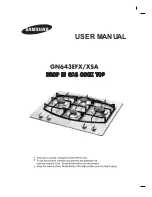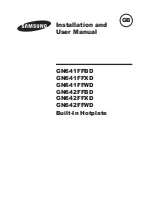
Cleaning and maintenance
82
4 Cleaning and maintenance
Instructions
Cleaning the surfaces
To keep the surfaces in good condition,
they should be cleaned regularly after use.
Let them cool first.
Ordinary daily cleaning
Always use specific products only that do
not contain abrasives or chlorine-based
acids.
Pour the product onto a damp cloth and
wipe the surface, rinse thoroughly and dry
with a soft cloth or a microfibre cloth.
Food stains or residues
Do not use steel sponges and sharp
scrapers as they will damage the surface.
Use normal, non-abrasive products and a
wooden or plastic tool, if necessary. Rinse
thoroughly and dry with a soft cloth or a
microfibre cloth.
Do not allow residues of sugary foods (such
as jam) to set inside the oven. If left to set for
too long, they might damage the enamel
lining of the oven.
Improper use
Risk of damage to surfaces
• Do not use steam jets to clean the
appliance.
• Do not use cleaning products containing
chlorine, ammonia or bleach on parts
made of steel or that have metallic
surface finishes (e.g. anodizing, nickel-
or chromium-plating).
• Do not use abrasive or corrosive
detergents (e.g. scouring powders, stain
removers and metallic sponges) on
glass parts.
• Do not use rough or abrasive materials
or sharp metal scrapers.
• Do not wash the removable components
such as the hob grids, flame-spreader
crowns and burner caps in a
dishwasher.
• Take care not to spill sugar or sweet
mixtures onto the hob when hot. Never
place materials or substances which
may melt (plastic or aluminium foil) on
the hob. If this occurs, promptly switch off
the cooking zones and clean while the
hot plate is still lukewarm to prevent
damage to the surface.
We recommend the use of
cleaning products distributed by
the manufacturer.
After cleaning, dry the appliance
thoroughly to prevent water or
detergent drips from interfering
with its operation or creating
unsightly marks.
















































